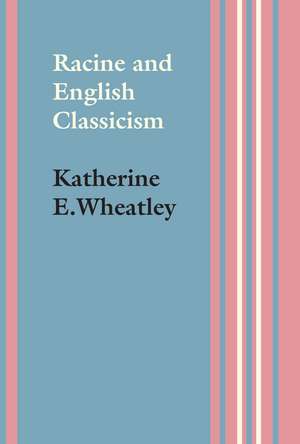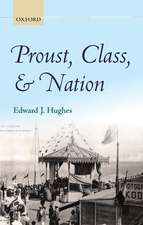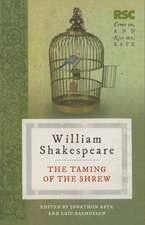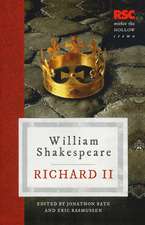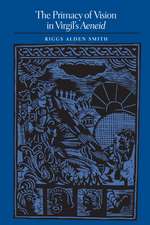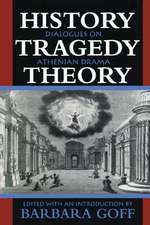Racine and English Classicism
Autor Katherine E. Wheatleyen Limba Engleză Paperback – 30 ian 2015
Katherine Wheatley here reveals the wide discrepancy between avowed intentions and actual results. Among the English plays she compares with their French originals are Otway’s Titus and Berenice, Congreve’s The Mourning Bride, and Philips’s The Distrest Mother. These comparisons, fully supported by quoted passages, reveal that those among the English public and contemporary critics who could not themselves read French had no chance whatever to know the real Racine: “The adapters and translators, so-called, had eliminated Racine from his tragedies before presenting them to the public.” Unacknowledged excisions and additions, shifts in plot, changes in dénouement, and frequent mistranslation turned Racine’s plays into “wretched travesties.” Two translations of Britannicus, intended for reading rather than for acting, are especially revealing in that they show which Racinian qualities eluded the British translators even when they were not trying to please an English theatergoing audience.
Why it is, asks the author, that no English dramatist could or would present Racine as he is to the English public of the neoclassical period? To answer this question she traces the development of Aristotelian formalism in England, showing the relation of the English theory of tragedy to French classical doctrine and the relation of the English adaptations of Racine to the English neoclassical theory of tragedy. She concludes that “deliberate alterations made by the English, far from violating classical tenets, bring Racine’s tragedies closer to the English neoclassical ideal than they were to begin with, and this despite the fact that some tenets of English doctrine came from parallel tenets widely accepted in France.” She finds that “in the last analysis, French classical doctrine was itself a barrier to the understanding of Racinian tragedy in England and an incentive to the sort of change English translators and adapters made in Racine.” This paradox she explains by the fact that Racine himself had broken with the classical tradition as represented by Corneille.
Preț: 280.21 lei
Nou
Puncte Express: 420
Preț estimativ în valută:
53.62€ • 55.98$ • 44.38£
53.62€ • 55.98$ • 44.38£
Carte tipărită la comandă
Livrare economică 04-18 aprilie
Preluare comenzi: 021 569.72.76
Specificații
ISBN-13: 9781477307007
ISBN-10: 1477307001
Pagini: 358
Dimensiuni: 152 x 229 x 24 mm
Greutate: 0.53 kg
Editura: University of Texas Press
Colecția University of Texas Press
ISBN-10: 1477307001
Pagini: 358
Dimensiuni: 152 x 229 x 24 mm
Greutate: 0.53 kg
Editura: University of Texas Press
Colecția University of Texas Press
Notă biografică
Katherine E. Wheatley (1894–1977) was Professor of Romance Languages at the University of Texas at Austin.
Cuprins
- Preface
- Part I. Racine Improved
- I. John Crowne and Racine
- II. Thomas Otway’s Titus and Berenice
- III. The Mourning Bride
- IV. Abel Boyer’s Achilles
- V. Edmund Smith and Racine
- VI. Andromaque as the “Distrest Mother”
- VII. Charles Johnson’s The Victim
- VIII. The Sultaness
- IX. The Fatal Legacy
- X. Two Translations of Britannicus
- Part II. Racine and English Classicism
- XI. Neo-Classical Theory of Tragedy in England, 1674–1699
- XII. English Judgments of Racine, 1675–1699
- XIII. Racine and the Critics, 1700–1721
- XIV. Summary and Conclusion
- Index
Descriere
A comparison of neo-classical English translations of Racine with the originals, and an analysis of what was changed and why.
